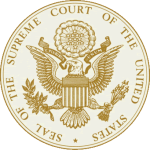- Industrie: Government
- Number of terms: 836
- Number of blossaries: 0
- Company Profile:
The highest court in the United States. It's the judicial branch of the United States government. The U.S. Supreme Court has the ultimate appellate jurisdiction over all state and federal courts.
The opinion issued by the court that heard the case immediately before the losing party asked the Supreme Court to review the case (almost always a federal court of appeals or a state court of last resort) is known as the opinion below.
Industry:Government
When it decides a case, the Court generally issues an opinion, which is a substantive and often long piece of writing summarizing the facts and history of the case and addressing the legal issues raised in the case.
Industry:Government
Sometimes called the “tenth justice,” the Solicitor General is the lawyer for the U. S. Government, and attorneys in that office are responsible for presenting cases on behalf of the United States in the Supreme Court. Someone from the Solicitor General’s office will also frequently argue on behalf of the United States when the government is not a party but has filed an amicus brief in the case.
Industry:Government
When the Court is deciding whether to grant certiorari in a case and thinks the view of the federal government might be relevant or useful — even though the United States is not a party — it can call for the view of the Solicitor General. The Solicitor General then files a brief in the case expressing the views of the United States government. Although a CVSG is technically an invitation, the Solicitor General always treats it as a command.
Industry:Government
An unsigned opinion, written for the Court as a whole by an unidentified Justices, is called a per curiam opinion. (In Latin, “per curiam” literally means “by the court. ”) Written dissents from per curiam opinions, however, are signed.
Industry:Government
Sometimes a judge votes with the majority of the court on the outcome of a case, but wants to write a separate concurring opinion (or “concurrence”). For example, a “concurrence in the judgment” may give different reasons for reaching the same conclusion.
Industry:Government
Pendapat yang dikeluarkan oleh pengadilan yang mendengar kasus ini segera sebelum pihak yang kalah meminta Mahkamah Agung untuk meninjau kembali kasus itu (hampir selalu pengadilan federal atau pengadilan banding keadaan last resort) dikenal sebagai pendapat di bawah ini.
Industry:Government
A habeas petition is a request for a court to review the legality of someone’s detention or imprisonment. All federal courts – not just the Supreme Court – can hear habeas petitions, though federal statutes impose significant constraints.
Industry:Government
The Supreme Court grants certiorari when it decides, at the request of the party that has filed a petition for certiorari, to review the merits of the case. For roughly every 100 petitions for certiorari received by the court, about one petition is granted. (If the Supreme Court denies certiorari in a case, then the lower court decision stands; the decision to deny certiorari does not make precedent. )
Industry:Government
When a party in a case is unhappy with the result at the lower court level (that is, in a state court of last resort or in a federal court of appeals), he has the option to file a brief asking the Supreme Court to hear its case. That brief is a petition for certiorari.
Industry:Government
